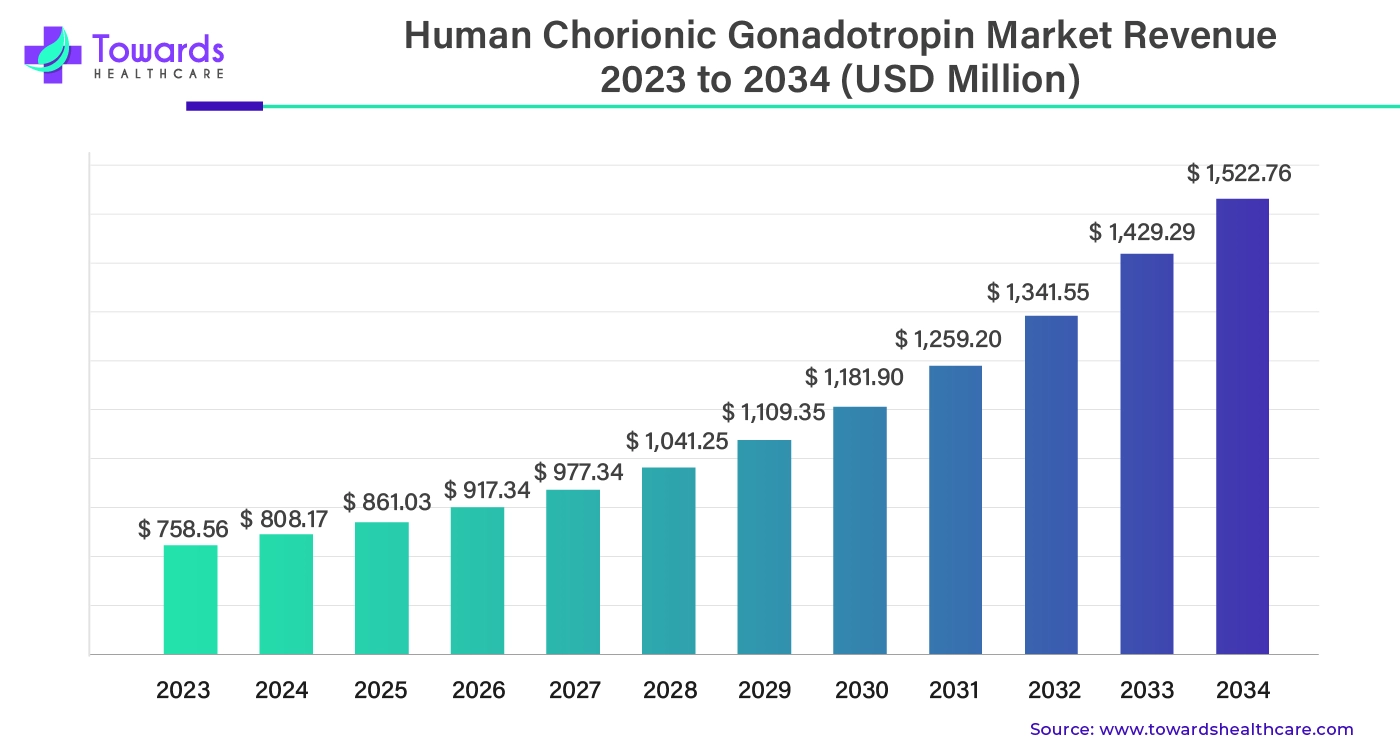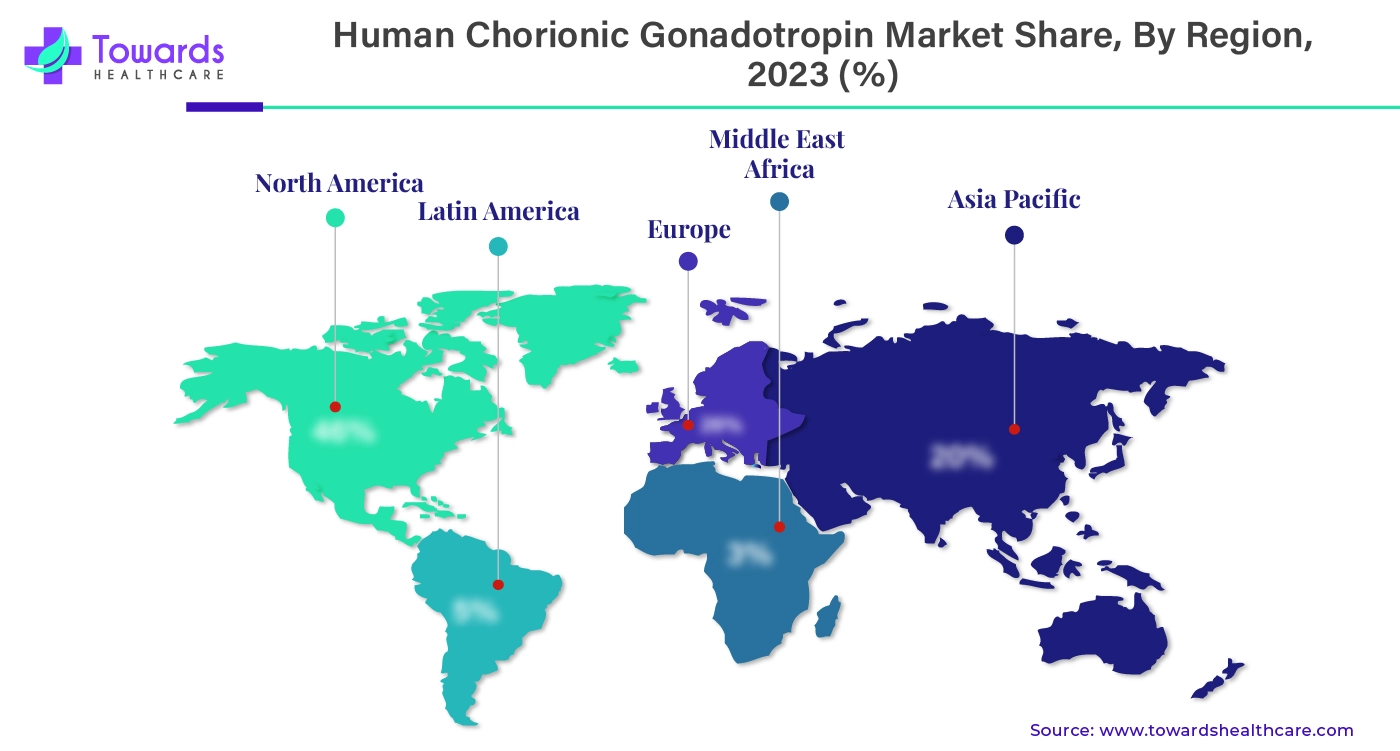February 2026

The global human chorionic gonadotropin market was estimated at US$ 758.56 million in 2023 and is projected to grow to US$ 1,522.76 million by 2034, rising at a compound annual growth rate (CAGR) of 6.54% from 2024 to 2034.

Human chorionic gonadotropin (hCG), also called pregnancy hormone, is a hormone produced during pregnancy and supports it. hCG promotes the synthesis of estrogen and progesterone, which helps thicken the uterine lining. The levels of hCG gradually increase during the first trimester of pregnancy, and measuring their levels in blood or urine confirms the pregnancy. hCG has numerous applications, including as a tumor marker for monitoring germ cell tumors and induction of ovulation and pregnancy in the case of infertility. It is also used in males to treat hypogonadotropic hypogonadism by stimulating the production of testosterone and sperm. Additionally, it is used in male infants to treat undescended testicles or prepubertal cryptorchidism.
AI has entered all sectors, including healthcare. AI has helped in different aspects such as drug discovery, clinical trials, patient management, patient monitoring, equipment feature enhancement, telehealth, remote monitoring, healthcare chatbots, and so on. In the case of the human chorionic gonadotropin market, AI can play a significant role in developing new therapeutics, conducting research, data analysis and management, and many more areas that can enhance the knowledge of healthcare professionals and improve the overall care quality of the patients.
The demand for in vitro fertilization (IVF) is increasing due to the rising prevalence of infertility, socio-demographic trends, and technological advancements. According to the WHO, around 17.5% of the adult population, i.e., 1 in 6 people globally, experience infertility in their lifetime. The lifetime prevalence of infertility was found to be 17.8% in high-income countries and 16.5% in low- and middle-income countries. IVF is a procedure of combining a woman’s eggs and a man’s sperm in a laboratory. IVF requires the administration of hCG for the final maturation of oocytes to boost egg production in a woman. According to the Society for Assisted Reproductive Technology, the number of babies born from IVF was 91,771 in 2022 in the US compared to 89,208 in 2021. Also, IVF has huge success rates in women under 35 years of age. Hence, all these aspects collectively promote the global hCG market.
The major limitation of the hCG market is its high cost. The cost of hCG injections varies from $200 to $1000, depending on the location and provider. This limits the affordability of the medications and increases non-adherence to them. Another limitation of hCG is the global supply chain issues that fail to fulfill the demand for hCG in the market. This results in a high demand-supply ratio.
The growing research and development facilities discover novel therapeutic applications of hCG. Several researchers have investigated the role of hCG in chronic rejection in solid organ transplantation. Hence, hCG has the potential to be used as an anti-rejection agent. hCG stimulates tolerance by influencing the human immune system. According to a 2011 study, women receiving hCG before IVF had reduced inflammatory IL17 and increased anti-inflammatory IL27 and IL10. hCG is also used in the treatment of paraneoplastic neuropathy mediated by anti-Hu antibodies. Additionally, hCG can be potentially used in the treatment of autoimmune diseases like rheumatoid arthritis and Sjögren’s syndrome. Therefore, a deeper understanding of these novel applications of hCG augments the market growth.
By product type, the native human chorionic gonadotropin segment dominated the human chorionic gonadotropin market in 2023. The native hCG is produced by the syncytiotrophoblast cells of the placenta during pregnancy. This hormone further stimulates the production of progesterone to maintain the pregnancy. The native hCG can be extracted from the urine of pregnant women. The native hCG have less reactivity as they are extracted and purified from humans.
By product type, the recombinant human chorionic gonadotropin segment is expected to grow at the fastest rate in the human chorionic gonadotropin market during the forecast period of 2024 to 2034. The human chorionic gonadotropin can be produced from cultures of genetically modified cells using recombinant DNA technology. The increasing demand for hCG hormones makes it difficult to create and distribute native hCG on a large scale, increasing the need for recombinant hCG. Additionally, recombinant DNA technology can be used to modify genes and manipulate them to be administered for therapy or diagnosis.
By therapeutic area, the female infertility treatment segment registered its dominance over the global human chorionic gonadotropin market in 2023. Female infertility can be mainly caused due to abnormalities in the ovaries, uterus, fallopian tubes, and the endocrine system. According to the WHO, about 60 to 80 million couples worldwide have infertility. In the US, about 11% of females of childbearing age have infertility. The chances of female infertility increases with age. In females from 15 to 34 years, the infertility rates ranged from 7.3% to 9.1%. While in females aged 35 to 39 years, the infertility rates increased to 25%. Additionally, in females of 40 to 44 years, the infertility chances increased to 30%.
In terms of therapeutic areas, the male hypogonadism segment is anticipated to grow with the highest CAGR in the human chorionic gonadotropin market during the studied years. Male hypogonadism is a condition in which the body does not produce enough testosterone – a hormone involved in masculine growth and development during puberty. hCG injection can treat hypogonadism by regulating the levels of testosterone in men. According to the American Urological Association, hCG can be injected in hypogonadal men to maintain fertility. Hypogonadism is common among men, and the prevalence of hypogonadism varies from 10% to 40%, depending on age, BMI, and comorbid conditions.
By distribution channel, the hospital pharmacies segment led the global human chorionic gonadotropin market in 2023. Patients prefer hospital pharmacies because all the medications prescribed by doctors are available. In hospitalized patients, nurses or resident doctors prepare a prescription, and the medications are ordered by the consultant. They also provide emergency and 24/7 services. Additionally, the eligibility for favorable reimbursement policies makes them a preferred choice. There are approximately 88,000 pharmacies in the US.
By distribution channel, the retail pharmacies segment is predicted to witness significant growth in the human chorionic gonadotropin market over the forecast period. hCG medications can also be purchased from licensed medical professionals and pharmacies that are outsourced. Retail pharmacies provide additional facilities like special discounts, home delivery, and 24/7 services. The other services provided by retail pharmacies include same-day delivery and on-demand pharmacist support. Retail pharmacies also have generic alternatives to the brand drugs, available at affordable prices.

By region, North America held the dominant share of the human chorionic gonadotropin market in 2023. The rising prevalence of infertility, sedentary lifestyles, advanced healthcare infrastructure, and favorable reimbursement policies drive the market. In the US, approximately 6.1 million women experience difficulty getting pregnant or staying pregnant. According to the Centers for Disease Control and Prevention, 9.4% of males, i.e., approximately 10,927,899 males and 11% of females, are infertile in the US. Whereas 15% of the couples are reported infertile, involving both males and females. The market is also driven by increased awareness about infertility treatment.
It is estimated that 1 in 6 couples in Canada experience infertility, representing 30% of the time in males and 40% of the time in females. Several key players, such as Fresenius Kabi Canada Ltd. and Ferring Canada, are the manufacturers of hCG injection in Canada. (Source: The Society of Obstetricians and Gynaecologists)
By region, Asia-Pacific is projected to host the fastest-growing human chorionic gonadotropin market in the coming years. The growing research and development, the rising prevalence of infertility, advanced healthcare infrastructure, the increasing geriatric population, and increasing investments drive the market. According to the Indian Society of Assisted Reproduction, India has around 27.5 million infertile people. According to the Fertility and Sterility organization, 25% of couples of reproductive age are infertile in China. The market is also driven by the growing pharmaceutical sector and drug exports. Countries like India, China, Singapore, and South Korea are the biggest pharmaceutical exporters in Asia-Pacific. China’s pharmaceutical exports between July 2023 and July 2024 were found to be around $1.02 billion. India mainly exports drug formulations and biologicals, with a share of 72.54%.
India is the leading exporter of hCG, followed by China and the U.S., with 2,503 shipments from October 2023 to September 2024. India exports hCG majorly to Singapore, Switzerland, and Nepal. It is estimated that 27.5 million people in India are infertile. (Source: Volza)
Europe also has the potential to augment the human chorionic gonadotropin market during the predicted period. The high demand for IVF treatment, increased awareness, and advanced healthcare facilities drive the market. Around 7.5% of males are reported infertile in Europe, while 15% of couples are known to be infertile. The prevalence of infertility is high in Central and Eastern Europe, i.e., around 20% of couples are infertile. Countries like Denmark, Spain, Germany, and Turkiye are widely recognized as the leading destinations for IVF treatment in Europe. It has been reported that each year, around 65,000 people undergo IVF treatment in Turkiye.
The growing awareness of infertility and fertility treatment augments market growth. According to a recent survey report on 56,245 participants, 20% of people aged 25-44 years experienced infertility. About 1 in 8 children in Denmark are born through fertility treatment. Denmark is the country with the most IVF treatments in the world, necessitating the use of hCG injections.
| Company Name | Scripps Laboratories |
| Headquarters | San Diego, California, US |
| Recent Development | In October 2023, Scripps Laboratories announced the development of a new era of recombinant proteins for research and diagnostic assay development. They tested recombinant proteins involved in anemia, cardiology, and endocrinology. Native hormones cannot cater to increasing demand. Hence, recombinant hormones like TSH, hCG, FSH, LH, and prolactin were developed, tested, and approved for use in clinical diagnostics. |
By Product Type
By Therapeutic Area
By Distribution Channel
By Region
February 2026
December 2025
December 2025
December 2025
